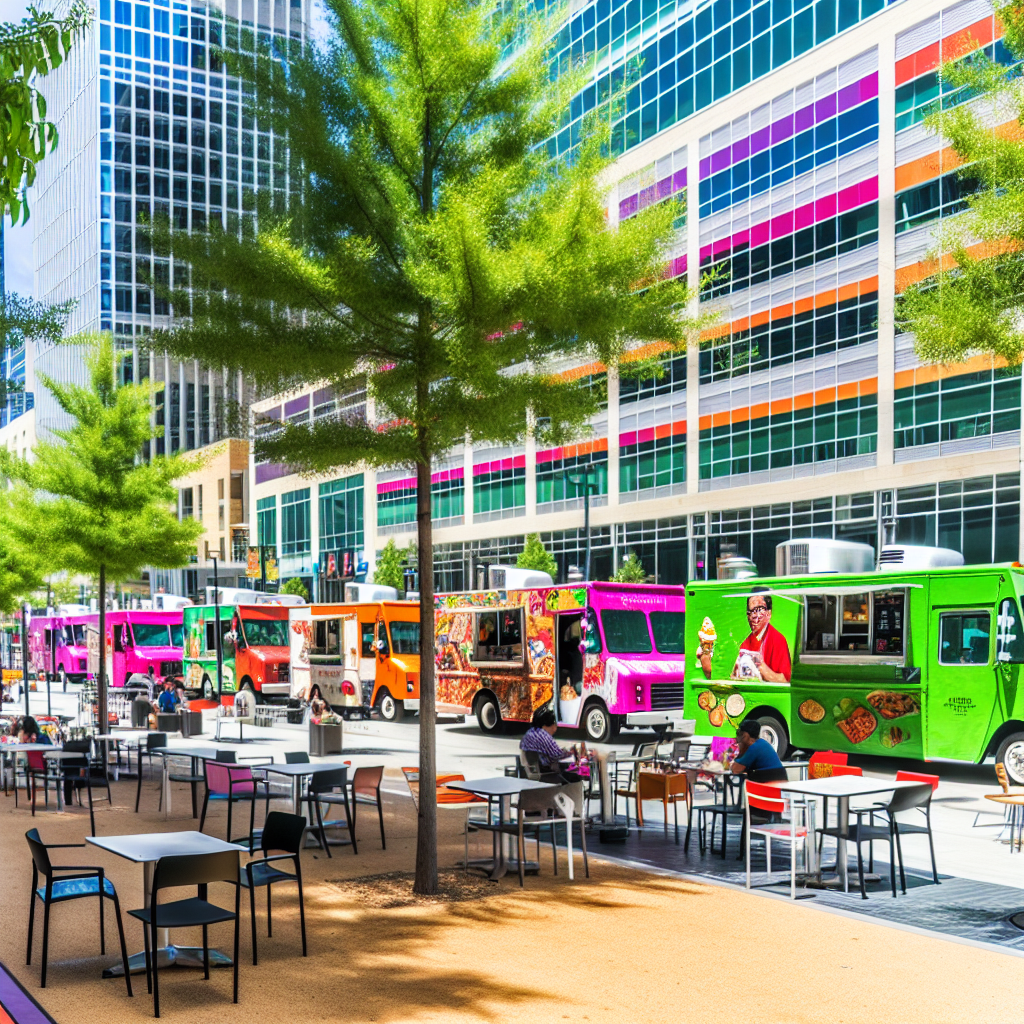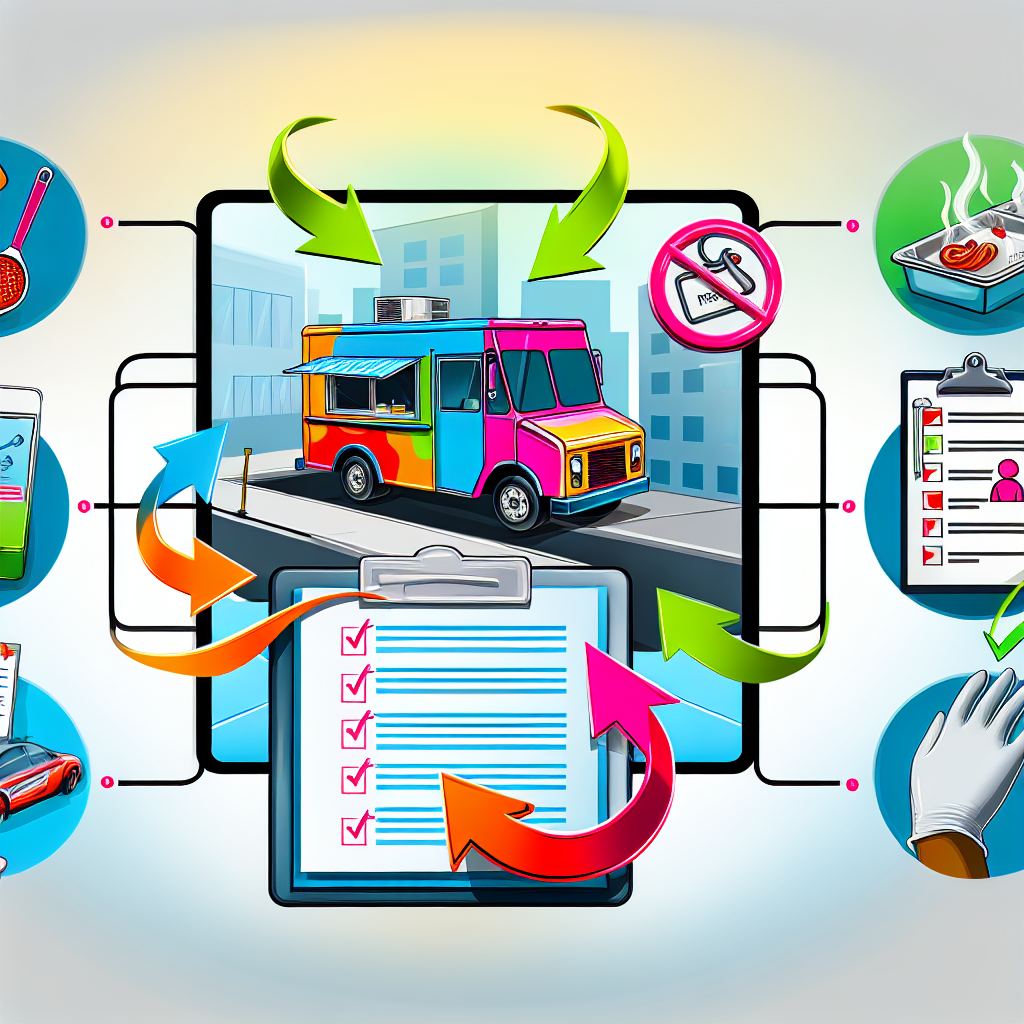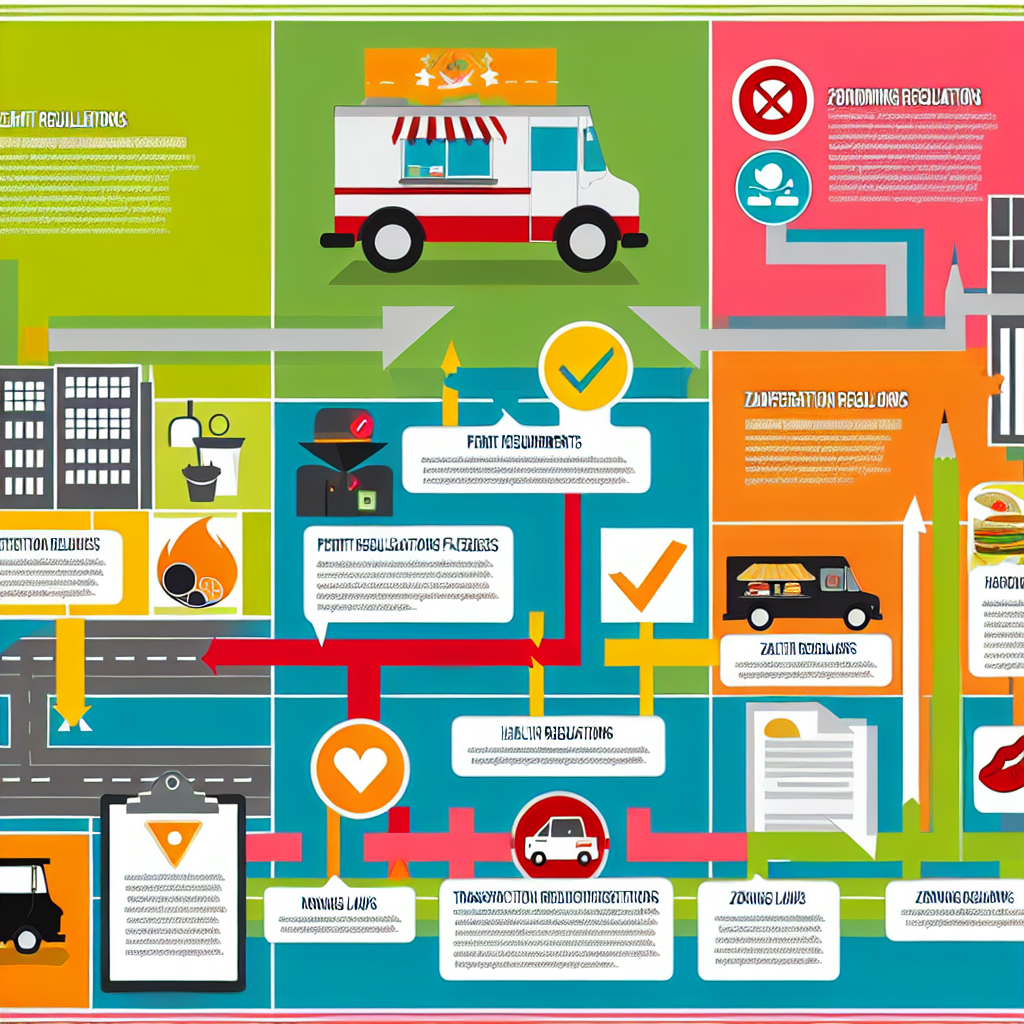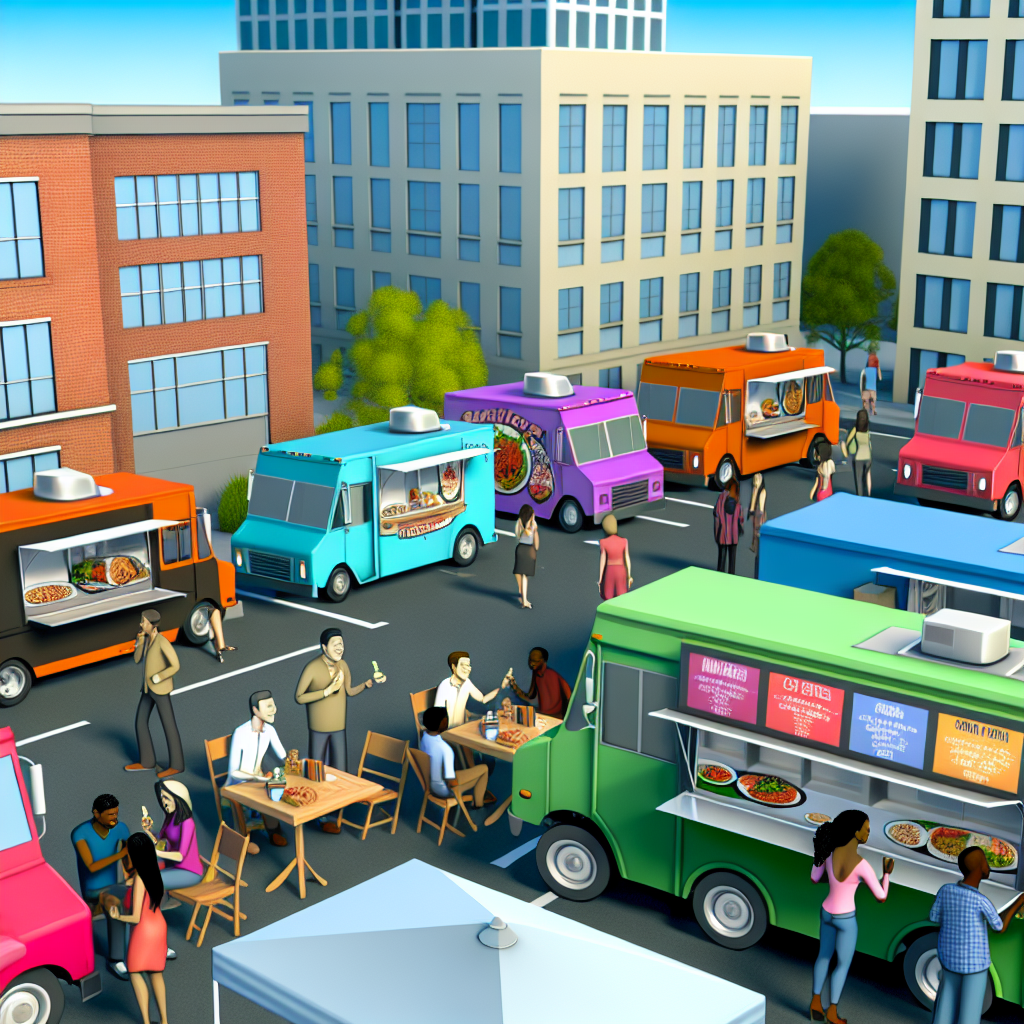The food truck industry has been experiencing remarkable growth over recent years, leveraging culinary creativity and a mobile business model to capture diverse market segments. This boom comes with an array of opportunities but also presents various challenges, particularly regarding the regulatory and legal landscape.
As food truck entrepreneurs attempt to carve out a niche in a competitive market, they must navigate complex laws and regulations that vary by location. From obtaining permits and licenses to adhering to health and safety standards, understanding these hurdles is crucial for success. Exploring how to effectively address these legal challenges can empower food truck owners to thrive in this evolving industry.
Key Regulatory Bodies in the Food Truck Industry
In the United States, the food truck industry is governed by various federal, state, and local regulatory agencies, each with distinct roles and responsibilities aimed at ensuring food safety, transportation regulations, and business compliance. Here is a summary of the key regulatory bodies involved:
Federal Agencies
-
Food and Drug Administration (FDA)
Role: Oversees the safety of most food products, excluding meat and poultry.
Responsibilities: While the FDA does not directly regulate food trucks, it provides guidelines that state and local health departments follow for food safety standards. FDA -
U.S. Department of Agriculture (USDA) – Food Safety and Inspection Service (FSIS)
Role: Ensures the safety of meat, poultry, and egg products.
Responsibilities: Regulates the processing and distribution of these food items, which must be sourced from inspected facilities to ensure they meet safety standards. Wikipedia -
Federal Motor Carrier Safety Administration (FMCSA)
Role: Regulates the safety of commercial motor vehicles.
Responsibilities: Food trucks classified as commercial vehicles must comply with FMCSA regulations regarding maintenance, qualifications, and operating hours. Wikipedia
State and Local Agencies
-
State Departments of Health and Agriculture
Role: Enforce food safety regulations specific to each state.
Responsibilities: Conduct inspections, issue permits, and ensure compliance with local laws regarding food safety. -
Local Health Departments
Role: The main regulators of food trucks at the local level.
Responsibilities: Handle licensing, inspections, and enforce food safety standards for food trucks within their areas. -
State and Local Departments of Transportation
Role: Regulate vehicle and transportation laws.
Responsibilities: Ensure food trucks meet safety standards, comply with parking regulations, and follow other transportation-related requirements. -
State and Local Business Licensing Agencies
Role: Oversee business operations in their jurisdictions.
Responsibilities: Ensure food truck operators obtain necessary business licenses and permits to operate legally.
Food truck operators must consult their specific state and local agencies to understand and comply with all relevant regulations. This navigational awareness is essential for successfully running a food truck business in today’s competitive market.
Common Regulatory Challenges Faced by Food Truck Owners
Food truck owners encounter several regulatory challenges that can impact their operations. Key areas include:
-
Permit Requirements (Food Truck Licensing Requirements): Food trucks must obtain various permits, such as business licenses, health permits, and parking permits. The process can be complex and varies by location. For instance, in Chicago, food trucks are required to install GPS tracking devices to monitor their locations. This requirement adds to operational costs and raises privacy concerns.
Source -
Health Regulations: Food trucks are subject to the same health and safety standards as traditional restaurants. This includes regular inspections to ensure proper food handling and sanitation practices. In Los Angeles County, illnesses linked to food trucks increased from 21 cases in 2009 to 33 in 2011. This statistic highlights the importance of adhering to stringent health regulations.
Source -
Zoning Laws: Many cities enforce zoning laws that restrict where food trucks can operate. For example, some cities prohibit food trucks from parking within a certain distance of brick-and-mortar restaurants to reduce competition. In Chicago, food trucks are not allowed to park within 200 feet of a restaurant, which limits available locations for vendors.
Source -
Transportation Regulations: Food trucks must comply with vehicle regulations, including safety standards and emissions controls. Additionally, some cities impose specific operational restrictions. For instance, in New Orleans, food trucks are required to change locations every 45 minutes, which can disrupt service and customer engagement.
Source
These regulatory challenges can create significant barriers for food truck operators. They affect the ability to compete effectively and thrive in the market.

This image represents the vibrant food truck scene in urban settings, showcasing colorful food trucks parked along a bustling street with people enjoying various foods.

This image illustrates the regulatory processes related to food truck operations, incorporating elements like permits, checklists, and health and safety icons.
Case Studies of Food Trucks Navigating Regulatory Hurdles
-
Kogi BBQ (Los Angeles, CA)
Overview: Founded by Chef Roy Choi, Kogi BBQ is known for its Korean-Mexican fusion cuisine, including Korean BBQ tacos.
Regulatory Hurdles: Faced challenges with health permits and complex zoning laws. By maintaining exceptional food safety standards and actively engaging customers through social media, Kogi BBQ became a staple in Los Angeles.
Outcome: Successfully navigated regulations, building a loyal customer base. -
The Halal Guys (New York, NY)
Overview: Starting as a single food cart in 1990, The Halal Guys have expanded to become a globally recognized brand.
Regulatory Hurdles: Compliance with intense health and safety regulations in NYC was crucial. By maintaining quality and cleanliness, they successfully navigated the regulatory landscape.
Outcome: Expanded reach while adhering to local laws, solidifying their status. -
Cousins Maine Lobster (Nationwide)
Overview: This food truck began in Los Angeles and has grown into a nationwide franchise known for Maine lobster dishes.
Regulatory Hurdles: Faced diverse local regulations in various markets. They worked with local health departments to ensure compliance while adapting operations.
Outcome: Significant growth through strategic regulation navigation and understanding local markets. -
Brewed Awakenings (City A)
Overview: A food truck that successfully offered craft beers with its menu.
Regulatory Hurdles: Obtained a temporary alcohol permit to serve craft beer at events, leading to substantial revenue increase.
Outcome: Built trust with customers through local compliance, resulting in a 30% increase in profits. -
Tasty Spirits (City B)
Overview: A gourmet food truck offering specialty cocktails.
Regulatory Hurdles: Secured a full liquor license, overcoming local licensing complexities.
Outcome: Attracted a dedicated following by thorough research and diligent compliance.
Key Takeaways:
- Food trucks must remain adaptable to local laws and regulations.
- High food safety standards and active customer engagement are crucial.
- Obtaining necessary permits and licenses is vital for growth and sustainability.
Best Practices for Compliance in the Food Truck Industry
Navigating local regulations is an essential part of operating a successful food truck. Here are some best practices that food truck operators should follow to ensure compliance:
- Obtain Necessary Permits
Food truck operators must secure various permits to operate legally. This includes:- Business License: Required to legally run a business in the locality.
- Health Permit: Ensures compliance with local health and sanitation standards.
- Fire Safety Permit: Necessary for the safe usage of cooking equipment and compliance with local fire regulations.
- Zoning and Parking Permits: Regulates where food trucks can park and operate, which varies from city to city.
Researching and fulfilling the specific requirements of the local jurisdiction is critical for legal operation. learn-business.org
For food safety practices, food truck operators are encouraged to refer to the Centers for Disease Control and Prevention (CDC) for guidance on best practices in food safety. Additionally, information from the Food and Drug Administration (FDA) can help ensure compliance with food safety standards.
- Adhere to Food Safety Standards
Maintaining high food safety standards is vital to protect public health and build customer trust. Best practices include:- Regular Staff Training: Ensure that all employees undergo food safety training to stay updated on proper food handling procedures.
- Routine Inspections: Conduct regular self-inspections to identify and address potential issues before formal evaluations.
- Use of Commissaries: Utilize licensed commissaries for food preparation and storage, as this can help streamline compliance with health regulations. studylib.net
- Engage with the Community
Positive community engagement enhances a food truck’s reputation. Strategies to consider include:- Participation in Local Events: Engaging in festivals and local gatherings increases visibility and demonstrates commitment to the community.
- Social Media Presence: Keeping active profiles on platforms like Instagram helps communicate with customers about locations and special events. foodtruckinsight.com
- Collaboration with Local Businesses: Partnering with nearby shops for cross-promotions can benefit both parties and foster local goodwill.
- Successful Case Studies
- Kogi BBQ (Los Angeles, CA): This popular food truck has successfully navigated health regulations and built a loyal following by engaging customers through social media and maintaining high food safety standards. foodtruckinsight.com
- The Halal Guys (New York, NY): Starting as a single food cart, they grew into a global brand by ensuring cleanliness, safety compliance, and consistent quality. foodtruckinsight.com
By diligently obtaining necessary permits, adhering to stringent food safety standards, and actively engaging with the community, food truck operators can ensure compliance with local regulations while building a successful and reputable business.
Comparative Table of Regulatory Requirements for Food Trucks by State
Navigating the regulatory landscape is crucial for food truck operators. Below is a comparative table outlining key regulatory requirements for food trucks across five states:
| State | Business License | Health Permits | Parking Regulations |
|---|---|---|---|
| California | Required; fees range from $50 to $200. Source | Mobile Food Facility Permit required; fees range from $140 to $1,010. Health permit fees range from $100 to $1,000. Source | Varies by city; some cities have designated food truck zones, while others require specific parking permits. Source |
| Texas | Required; fees range from $25 to $100. Source | Food Manager Certification required; fees range from $100 to $200. Source | Regulations vary by city; some cities have streamlined permitting processes, while others have complex health department requirements. Source |
| New York | Required; fees range from $25 to $100. Source | Food Protection Certificate required; fee is $15 per person. Source | New York City has extremely limited permits, with some permits having a market value exceeding $200,000. Source |
| Florida | Required; fees range from $25 to $100. Source | Mobile Food Dispensing Vehicle License required; fees range from $50 to $150. Source | Regulations vary by city; some cities have high permit costs and competitive markets, while others have moderate regulations. Source |
| Illinois | Required; fees range from $75 to $200. Source | Food Service Sanitation License required; fees range from $75 to $150. Source | Chicago has complex permitting with high fees (over $1,000), while other cities have more moderate requirements. Source |
Please consult local regulations and authorities for the most up-to-date information and specific requirements that may vary by city or county.
City-Specific Regulatory Notes
New York City:
Food truck operators must have a business license, a mobile food vending license, and a health department permit. These permits require regular inspections and compliance with strict sanitation standards. New York City also has limited parking availability for food trucks, with specific designated zones and time restrictions that operators must adhere to. Non-compliance can lead to hefty fines and the potential loss of permits. Source
Los Angeles:
Operators require a business tax certificate, public health operating license, and a commissary permit. Health department oversight ensures that food trucks comply with strict sanitation and safety guidelines. Parking for food trucks in Los Angeles comes with rules about operating near intersections and designated food truck zones. Source
Chicago:
Food truck operators are required to obtain a mobile food license, health permits, and a fire safety inspection certificate. The city has complex regulations about where trucks can park, including a minimum distance requirement from established restaurants. Compliance with health inspections is crucial, as non-compliance may lead to substantial fines or permit revocation. Source
San Francisco:
Food trucks must secure a mobile food facility permit from the Department of Public Works, ensuring operations are compliant with city regulations. Health inspections are mandatory, and food trucks must adhere to minimum clearances from existing restaurants and other public structures. Source
Denver:
A retail food establishment-mobile license is necessary to operate, with health department compliance being enforced through regular inspections. Denver restricts food trucks from operating within 300 feet of parks unless associated with events. Source
Boston:
Operators require a mobile food truck permit from the city, and compliance with the State Sanitary Code is enforced via inspections. Food trucks face restrictions on providing dining areas without prior approval. Source
Detroit:
A mobile food facility permit and local health department compliance are necessary. Operating on public streets is prohibited, forcing food trucks to utilize private property for sales. Source
Austin:
Mobile food vendor permits and food manager certification are required. Operators must comply with location guidelines and restrictions as to where trucks can park and operate. Source
Seattle:
A street use permit, health permit, and business license are needed for food truck operations. Health inspections ensure compliance with health department regulations. Tight restrictions are often placed on where trucks can park and operate. Source
Miami:
Operators need a mobile food dispensing vehicle license, and they must comply with the stringent regulations from local health departments. Specific parking restrictions are enforced throughout the city. Source
Washington D.C.:
Food truck operators must have a vending business license and comply with health and fire safety inspections. Specific parking regulations define where food trucks are allowed to operate in the city. Source
Enforcement Mechanisms in the Food Truck Industry
Regulatory bodies implement a variety of enforcement mechanisms to ensure that food trucks comply with health and safety regulations, permit requirements, and vehicle safety standards. Here are some of the primary methods:
-
Health Department Permits and Inspections
Food trucks are required to obtain permits from local health departments, which conduct regular inspections to assess cleanliness, equipment functionality, food storage, and preparation practices. For example, in Massachusetts, each Mobile Food Establishment (MFE) requires a separate permit for each municipality in which it operates, and inspections may include evaluating the servicing area where the MFE returns for cleaning and restocking. [mass.gov] -
Food Handler Certifications
Operators and employees often need to obtain food handler’s permits or certifications, such as ServSafe®, to ensure they comprehend proper food safety practices. This includes handwashing protocols, preventing cross-contamination, and ensuring safe cooking temperatures. Maintaining a log for certification expiration dates assists with compliance. [shoalsbusinessincubator.com] -
Fire Safety Inspections
Due to the use of gas stoves and fryers, food trucks must meet fire safety regulations. Inspections focus on propane tanks, exhaust systems, and fire extinguishers to ensure compliance with safety standards. For instance, Florida mandates food trucks be equipped with functional fire safety equipment, including a hood suppression system and a portable fire extinguisher rated at least 3A-40BC. [shopsatnorthpark.com] -
Vehicle and Equipment Standards
Food trucks must fulfill specific vehicle and equipment standards, including fire safety systems and proper food handling tools. Regular inspections confirm that all trucks maintain compliance with state health regulations, ensuring operational readiness. All trucks are required to have a functional fire extinguisher and a hood suppression system with current service tags. [shopsatnorthpark.com] -
Zoning and Location Regulations
Local authorities regulate the operational areas of food trucks to prevent obstruction of public access and ensure safety. This includes parking restrictions, operating hours, and proximity to brick-and-mortar establishments. For instance, Washington State enables cities and towns to regulate food cart operations, including location and hours. [mrsc.org] -
Administrative Penalties and Enforcement Actions
Non-compliance with regulations can result in administrative fines, suspension, or even revocation of permits. In Texas, for example, counties or public health districts may refuse to issue or may suspend or revoke a permit if a food service establishment is non-compliant with state laws or local orders. [statutes.capitol.texas.gov]
These enforcement mechanisms work in concert through regular inspections, mandatory certifications, adherence to safety standards, and strict compliance with local regulations. Ensuring these practices are adhered to is vital for maintaining public health and safety in the food truck industry.
Conclusion
Navigating the regulatory landscape can be one of the most significant challenges for food truck operators. With a multitude of laws and regulations varying from one locality to another, compliance can often feel overwhelming. Food truck proprietors must stay vigilant in understanding permit requirements, health regulations, and zoning laws to ensure they can operate smoothly and legally.
The importance of compliance cannot be overstated. Failing to secure the necessary permits or meet health standards can result in hefty fines, suspension of operations, or even permanent closure. Furthermore, maintaining quality and safety standards instills customer trust and reinforces a brand’s reputation in a highly competitive environment. As demonstrated by various case studies, businesses that prioritize understanding and adhering to regulations not only survive but thrive.
It is crucial for food truck operators to stay informed about updates and changes in regulations at the local, state, and federal levels. Regular communications with local health departments, participation in food truck associations, and active engagement with community stakeholders will empower operators to navigate potentially complex legal frameworks. By doing so, they position themselves for success in a dynamic market.
In conclusion, while the regulatory hurdles in the food truck industry are significant, they are not insurmountable. With proactive measures, continuous education, and a commitment to compliance, food truck operators can overcome these challenges and pave the way for a successful and rewarding culinary adventure.

This infographic visually represents the complex regulatory challenges faced by food truck owners, including details about permits, health regulations, zoning laws, and transportation regulations.


